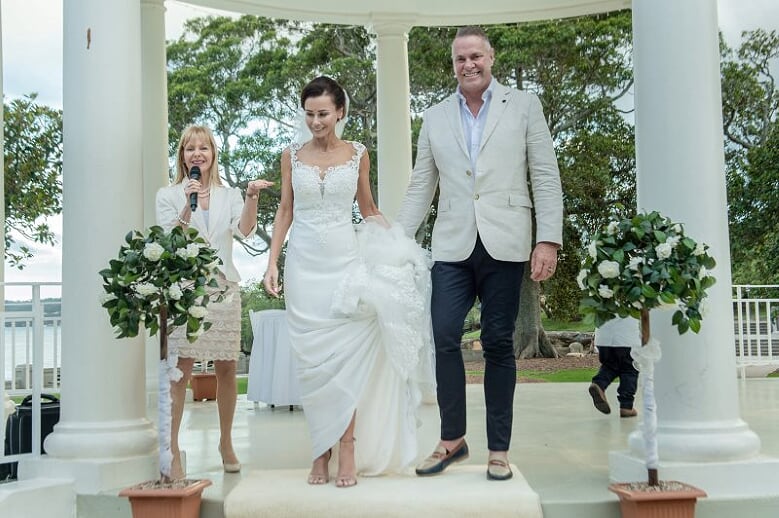Tips for Choosing the Perfect Wedding Celebrant
- Check Their Credentials
Make sure your celebrant is fully registered and legally authorised to conduct weddings in Australia. - Understand Their Style
Every celebrant has their own approach—formal, relaxed, humorous, or spiritual. Choose one whose style aligns with your vision. - Social media posts
You can always view the celebrant’s social media engagement such as Instagram, FB and others. - Look for Personalisation
A great celebrant takes the time to know your story and creates a ceremony that feels unique, heartfelt, and true to you. - Ask About Experience
Experienced celebrants bring confidence, organisation, and the ability to adapt if anything unexpected happens. - Read Reviews & Testimonials
Past couples’ feedback offers valuable insights into how the celebrant connects with people and delivers ceremonies. Reviews both on their websites and of course on Google Reviews. - Consider Communication & Connection
You should feel comfortable, supported, and understood. Chemistry is key—it’s important that you “click” with your celebrant. - Discuss Flexibility
Whether you’re planning a beach wedding, garden ceremony, or intimate elopement, your celebrant should be adaptable to the location, day and time of your wedding. - Confirm Legal Knowledge
From lodging the Notice of Intended Marriage (NOIM) to registering the marriage, your celebrant must handle all wedding legalities seamlessly. - Ask About Extras
Some celebrants also provide vow-writing guidance, ceremony planning resources, a PA systme for your music. - Trust Your Instincts
Ultimately, your celebrant should feel like the right fit—someone who will honour your love story and make the day memorable.

Why is Your celebrant important?
- Sets the tone.
- Captures your story.
- Ensures your ceremony feels truly authentic to who you are as a couple.
- Handles the legalities with precision, giving you peace of mind.
- Create an atmosphere of warmth, meaning, and joy that you and your guests will remember forever.
Choosing the right wedding celebrant when planning a wedding is one of the most important decisions you’ll make for your big day.
What Does a Wedding Celebrant Do?
Legal Duties in Australia
A marriage celebrant ensures your marriage is legally married under Australian law. This includes lodging the Notice of Intended Marriage, verifying identity documents, and submitting your official legal paperwork to Births, Deaths and Marriages. An authorised marriage celebrant handles all the formalities so your union is recognised.
Personalisation of the Ceremony
Civil marriage celebrants don’t just tick legal boxes—they craft a ceremony that reflects your love story, values, and personality. From customised vows to thoughtful readings, they help bring your vision to life.
Civil vs. Religious Celebrants
A civil celebrant offers non-religious services, while ministers or religious celebrants follow specific religion-based rituals. Think about whether a traditional or modern tone suits your special day.
Why Your Choice of Celebrant Matters
Impact on the Tone of the Ceremony
A celebrant’s presence, voice, personality and style directly affect how the ceremony feels. Warm and engaging? Light and fun? Deep and reflective? Your celebrant sets the tone. It’s one of the most important decisions for your specila day.
How a Good Celebrant Helps Calm Nerves
They’ll guide you through every step and offer reassurance, especially if you feel overwhelmed. Their experience helps create a calm, confident atmosphere. a celebrant that makes you feel comfortable.
Making the Ceremony Uniquely Yours
Great celebrants invest time in getting to know you. They incorporate your love story, traditions, humour, and preferences to make the ceremony feel authentic.
FAQ Before Booking Your Celebrant
Focus on availability, ceremony style, how many weddings they’ve done, and how they support you through the process.
Are you available on our date? Availability is the first check. Most celebrants book out early—sometimes a year or more in advance. So will your chosen celebrant be available on your wedding date.
What’s included in your fee? Are there additional costs for travel, rehearsals, or paperwork? Clarify exactly what you’re paying for to avoid surprises later.
How many weddings have you done? Experience matters. Ask for examples of past weddings or read client testimonials.
Do you offer a rehearsal? Rehearsals can reduce stress and ensure everyone knows their cues.
Can you help with our vows? Many celebrants assist in writing or reviewing your vows to ensure they’re meaningful and cohesive.
What’s your ceremony style? Ask how they structure ceremonies and whether they lean formal, fun, spiritual, or laid-back.
How do you handle legal paperwork? A great celebrant will manage everything, keeping your paperwork on track for submission.
Can we see or hear a recording of you delivering a ceremony? Hearing their voice and delivery can help you decide if they’re the right fit.
What does your process look like from booking to the big day? Look for a clear timeline that includes meetings, ceremony drafts, and document handling.
Do you connect us with other wedding suppliers? Does the celebrant have contacts with other vendors, suggests venues, such as a photographer and work closely with the couple on the journey to the wedding day.
Do you have tips for Wedding Planning? The right celebrant will have tips for the big day.
Legal requirements Covered? A perfect celebrant will attend to all the legal paperwork.
How to Shortlist and Compare Celebrants
- Read reviews and testimonials on their website or directories
- Schedule a video call or in-person meeting
- Assess their tone, personality, and whether they “click” with you
- Talk to other couples, family and friends
Ask yourself: Do we feel relaxed around them? Do they seem genuinely interested in our story?
Common Mistakes to Avoid
- Choosing based on price alone
- Leaving it too late—many top celebrants book 12–18 months in advance
- Not understanding their legal responsibilities
FAQ about celebrants
What happens if our celebrant is sick? Experienced celebrants usually have a backup network to ensure you’re covered.
How to choose someone to officiate your wedding? Look for someone who makes you feel seen, heard, and valued. Check credentials, reviews, and their approach.
What makes a good marriage celebrant? Warmth, professionalism, adaptability, legal knowledge, and storytelling skills.
What questions should I ask a celebrant? Start with availability, fees, experience, ceremony style, legal support, and how they personalise ceremonies.
How much roughly is a celebrant? Fees vary, but in Australia, expect anywhere from $500 to $1500 depending on experience, travel, and inclusions.
Can we write our own vows? Yes! Most celebrants encourage you to express yourselves personally.
Choosing the perfect marriage celebrant may be one of the most important decisions of your wedding planning.
Contact me and I’ll work closely with you, support you through the legal requirements, and ensure your wedding day is a heartfelt celebration that reflects your love story.
Your civil celebrant plays a vital role in bringing your dream ceremony to life.







